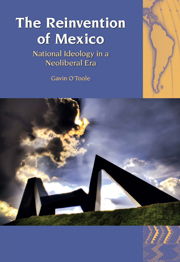Book contents
- Frontmatter
- Contents
- Preface
- I Nationalism and Liberalism
- II Construction: State Discourses
- III Contestation: Opposition Discourses
- 5 The Intellectual Reassessment of National Ideology
- 6 Nationalism and the Left: The PRD
- 7 Nationalism and the Right: The PAN
- Conclusion: The Fate of Mexican National Ideology
- Bibliography
- Index
5 - The Intellectual Reassessment of National Ideology
from III - Contestation: Opposition Discourses
- Frontmatter
- Contents
- Preface
- I Nationalism and Liberalism
- II Construction: State Discourses
- III Contestation: Opposition Discourses
- 5 The Intellectual Reassessment of National Ideology
- 6 Nationalism and the Left: The PRD
- 7 Nationalism and the Right: The PAN
- Conclusion: The Fate of Mexican National Ideology
- Bibliography
- Index
Summary
State and PRI officials were not the only people to reassess nationalism during the Salinas period, and intellectuals across the political spectrum also turned their attention to the national question. Many had undertaken postgraduate studies at prestigious institutions of higher education in the US and France, conducted research at Mexico's foremost research centres and universities, such as the Colegio de México, where Salinas's Commerce Secretary, Jaime Serra Puche, taught during the 1980s, the Centro de Investigación y Docencia Económicas (CIDE), or the Universidad Nacional Autónoma de México (UNAM). Many were linked to or wrote for the same influential publications, such as the culturally conservative Vuelta magazine, associated with Mexico's most celebrated poet, Octavio Paz, the conservative Reforma newspaper, the pro-PRI Excélsior newspaper, the centre-left Nexos and Proceso magazines, and the left-of-centre newspaper La Jornada. The underlying aim of this intellectual reassessment was to understand how modernization was testing the national idea, and to discern the features of the new society that it would give rise to. Such a reassessment took the form of a newly critical approach to the hitherto dominant tenets of national ideology, which contributed to a wider transformation in intellectual life amounting to a paradigm shift. This ended an intellectual consensus in support of the national ideology as constructed by the post-revolutionary state and permitted a critical deconstruction of the national idea. There was a recognition that nationalism no longer served to legitimize modernization by the PRI state.
- Type
- Chapter
- Information
- The Reinvention of MexicoNational Ideology in a Neoliberal Era, pp. 133 - 164Publisher: Liverpool University PressPrint publication year: 2010



